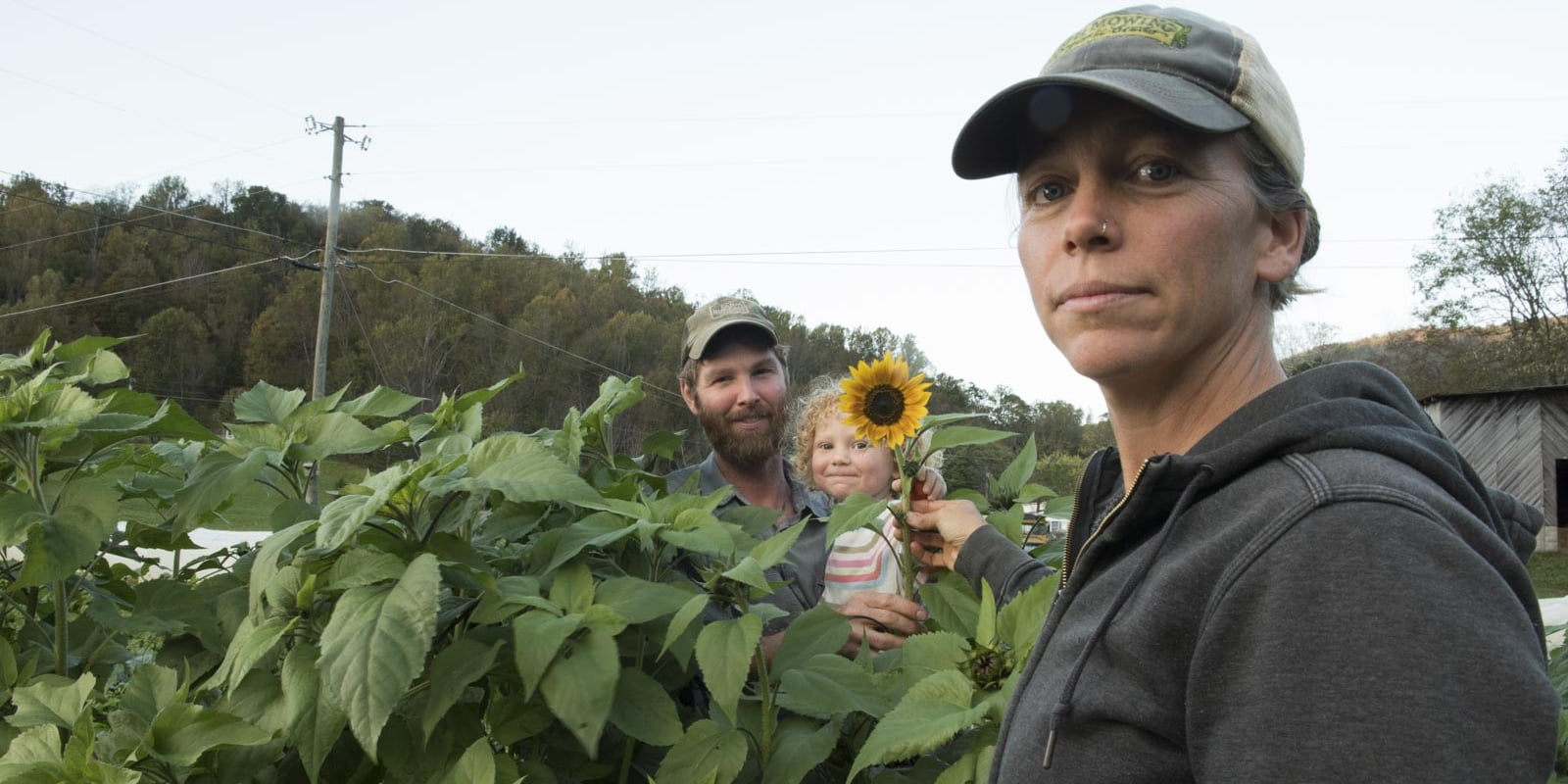Farmer Holly Whitesides will give a welcome address as part of the 2024 Business of Farming Conference on February 24 at A-B Tech in Asheville. Holly has been farming at Against the Grain Farm in Watauga County, North Carolina, since 2012, alongside Andy Bryant and their three daughters, Beatrice, Corva, and Linnea.
Can you tell me a little bit about Against the Grain Farm?
We’re a small, diversified, Certified Organic vegetable farm. We grow intensively on around two acres, mostly for direct markets. We have a CSA, we go to a farmers market year-round, we sell to a pretty good list of local area restaurants and also to the High Country Food Hub. We’re a full time farming family. We do this as our primary source of income and livelihood. We hire folks seasonally, but we also carry a few year-round employees as well.
The CSA is really special to us. One piece that we saw early on in our farming journey is that local food is inaccessible for a lot of people, especially in Watauga County. How do people of limited means get access? The flip side, especially from a farmer perspective, is that food is undervalued in our country and our culture. That felt really challenging to bridge. We started a cost share fund with our CSA [in which CSA members can contribute to free shares for community members in need]. It’s small, but we were able to provide 10 CSA shares—which is about 10 percent of our CSA—to members ot the community. That’s really positive for us—a way we can feel like we’re making difference in our corner of the world.
What have been some of your biggest challenges as a farmer?
The word balance keeps coming to mind. For us, the work-life balance of being a first-generation, direct-market farm has been really hard. The presence of children, creating that family, has been a humongous drive for us. That’s a real push for us to find farm-personal life balance. It’s one of the biggest challenges, but also such a gift because it has encouraged us to really refine what we do and make things more effective and efficient. It’s ongoing. It’s not like it’s arrived and we have achieved balance. But we always getting better.
Balance really carries into other aspects of our farming journey. There is a challenge in balancing our holistic goals—the social health of the farm, the financial health of the farm, and the biological health of the farm. Seeing how they all feed each other and can even feel in opposition has offered so many growth points.
What keeps you farming?
The fact that farming is this repeated invitation to grow and learn more and refine and improve. There’s always an opportunity to learn from other farmers, learn from the soil, learn from co-workers, learn from the community—a constant unfolding of discovery. I think that this is undeniably attractive to me. That’s what keeps me going.
My farming life has turned more into the management of farm as it’s grown. It’s not necessarily work I love in and of itself, but because it’s for the overall farm goals and vision, it keeps me going from day to day. Right now I’m in a phase of my life when I work nights and weekends, and that’s really challenging. With any other job, I would be like, “Forget this!” But the farm is almost a family member. It’s my firstborn child, in a way. Maybe other small business owners feel this way. You’re in this relationship with this piece of land, this being. I don’t want to leave it by the wayside.
Are there takeaways from attending the Business of Farming Conference over the years that have been particularly valuable for you and your farm?
I really appreciate being around other small farmers who are thinking about the business side of farming. So often the focus is on production, and obviously that’s really important. But being in a space and having that focus on being economically savvy in this world we live in is a great balance. Farmers are usually inspired to farm because they love to be outside, love to get their hands dirty, love feeding people. There aren’t a lot that are like, “I love Quickbooks, I love to think about cash flow.” Creating space to think about things that are challenging or a little inaccessible can be so helpful
I love that a lot of workshops are presented by other farms. That peer-to-peer learning and networking that is so valuable. There was a Selling to Restaurants session that really ignited a lot of lightbulbs for me early on in our farm journey. I also attended a workshop on agritourism, because we were thinking about having rentals on farm. It was well presented—and I realized that was not the direction we needed to go because of our personalities and culture on the farm. Workshops can be great as way to introduce topics and concepts that maybe you’ve considered and researched, but need to hear more about.
Any tips you would offer beginning farmers to get the most out of the conference?
Definitely try a workshop that is on a topic that maybe isn’t even in your sphere of consideration. Take some classes that are immediately in your scope of need or interest, and then try one here and there that’s out of your comfort zone. For example, long-term succession planning, how to pass a farm to the next generation, is so helpful for a farmer. The more you learn about these concepts now, you’ll have some recognition and understanding as they become more relevant to you.

